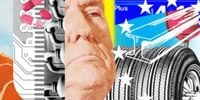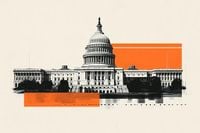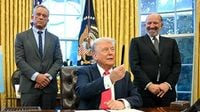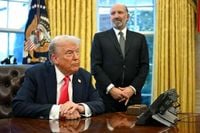In a bold move that could reshape global trade dynamics, U.S. Commerce Secretary Howard Lutnick announced on April 3, 2025, that President Donald Trump's recently unveiled tariffs will initiate a "re-ordering" of international trade. This declaration came shortly after Trump signed an executive order imposing reciprocal tariffs on over 180 countries, including a significant 27% tariff on goods from India, set to take effect on April 9.
During an interview on CNBC's "Squawk Box," Lutnick expressed confidence that these aggressive tariffs would compel other nations to reassess their trade policies and provide greater access to American products. "This is the reordering of fair trade," he stated. "It’s about those non-tariff trade barriers. That’s what we are addressing." He emphasized that the U.S. would retaliate against any duties imposed on American goods elsewhere, pushing for a more equitable global trading environment.
The announcement, however, sent shockwaves through the stock market, with futures linked to the Dow Jones Industrial Average plummeting by more than 1,100 points. The U.S. dollar also faced heavy selling pressure, dropping approximately 2% to 101.65, as investors reacted to the potential economic fallout of the tariffs.
Trump's tariff strategy, which includes a blanket 10% duty on all imports, aims to reduce the U.S. trade deficit, which stood at $122.7 billion in February. While this figure marked a slight decrease from January, it still represented a staggering 86% increase from the same period in 2024. Lutnick indicated that these tariffs are part of a broader initiative to ensure that U.S. agricultural products gain better access to foreign markets, stating, "I expect most countries to start to really examine their trade policy towards the United States of America, and stop picking on us." He urged nations to reconsider their barriers against American exports, particularly in agriculture.
Despite Lutnick's optimism, economists have raised concerns about the potential for a damaging trade war and rising inflation as a result of these tariffs. Critics argue that while tariffs may protect domestic industries in the short term, they could lead to higher prices for consumers and retaliatory measures from other countries. Lutnick acknowledged these risks but remained firm in his belief that the long-term benefits would outweigh the short-term consequences.
In a recent interview, Lutnick reiterated the administration's commitment to engaging with major trading partners to negotiate fairer terms for U.S. goods. "We are talking with all major trading countries, and U.S. products are going to have to be sold there," he asserted, emphasizing the need for countries to adjust their regulations to facilitate U.S. exports.
However, the political landscape surrounding these tariffs is complicated. Some insiders within Trump's administration have suggested that Lutnick could be positioned as a scapegoat if the tariff strategy fails. Sources close to the administration indicated that many are frustrated with Lutnick's aggressive stance and frequent media appearances, leading to speculation that he may bear the brunt of any backlash stemming from the tariffs.
As Trump labeled April 2 as "Liberation Day" for American trade, he boasted that the new tariffs would end U.S. reliance on foreign goods. He pointed to the trade deficit with India, which currently stands at $46 billion, and criticized the country for imposing a 52% tariff on U.S. imports while the U.S. had charged little to nothing in return for years. This rhetoric has fueled concerns that the new tariffs could lead to significant economic repercussions, particularly for lower-income consumers and businesses reliant on imports.
Experts, including analysts from Moody's, have warned that a blanket 20% tariff could be catastrophic, potentially leading to job losses and a recession. They argue that the ripple effects of such tariffs could destabilize the stock market and increase costs for everyday goods.
Despite the potential risks, Lutnick remains a staunch advocate for Trump's tariff policies, pushing for even more stringent measures to reduce the trade deficit and balance the budget. He has been described as a "new voice at the table pushing crazy ideas" by some insiders, who express concern over his influence within the administration.
In contrast, Treasury Secretary Scott Bessent has advocated for a more targeted approach to tariffs, focusing on the U.S.'s largest trading partners rather than a sweeping strategy that could alienate multiple nations. As the debate continues within the administration, the impact of these tariffs on the American economy remains to be seen.
As the situation unfolds, businesses across the nation are left scrambling to assess the potential impacts of the new tariffs. The corporate world is on edge, anticipating whether the economic fallout will compel the Trump administration to reconsider its approach. With the stakes at an all-time high, all eyes are on Lutnick and the administration's next steps.







